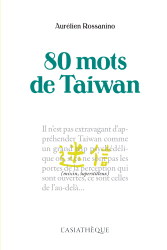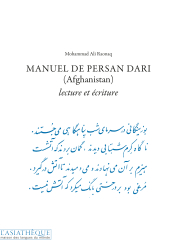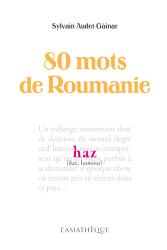Details
Format: Paperback
ISBN: 9782360571956
Collection: Monde coréen
13.5 x 21.5 cm
Weight: 321 gr
Pages: 252
First publication: 27/11/2019
Last printing: 11-2020
Confucian tradition versus Cartesian mind
Korean people are friendly, generous, caring, supportive, but also hypersensitive and easily fiery ... They put the interest of the group above the whims of the ego. All will fight without the slightest reluctance for their country. They will fight in 2002 to make South Korea shine during the World Cup football as they fought in 1997 to cope with a possible bankruptcy. But there it is, they are sensitive and tend to stick to the first glance to gauge the person. If you miss the mark, it will take time and effort to get a second chance. It is a complex situation ... In short, the Korean is for the French a traveling enigma. The book "My Koreans" by Georges Arsenijevic, a consultant for 35 years at the Korean Cultural Center in Paris, delivers, in 20 chapters illustrated with anectodes and true stories, a guide to better understand the citizens of The Land of the Morning Calm. It will help to avoid any blunders, learn how to move koreans' heart, with both sincerity and involvement in the relationship, but above all by acquiring the knowledge of thousands of subtleties that make the difference. Author of a book on football, three collections of poems and numerous articles published in specialised journals in the fields of psychology and culture, Georges Arsenijevic is also psychosociologist by training and a former teacher of French as a foreign language, besides being consultant to the Korean Cultural Center and editor-in-chief of the magazine Korean Culture. His experience allows him a sharp analysis of what constitute and distinguish cultural codes on both sides as it is about looking upon another but also looking at oneself, in order to sort out what can be the cause of a misunderstanding for both sides. Therefore, the content of the book is double. In a pleasant way, according to the anecdotes, it actually offers you two mentality guides, which French and Koreans alike can take advantage of.
PRESS REVIEW
Georges Arsenijevic takes advantage of everything he has learned while occupying the post of Counsellor at the Korean Cultural Center in Paris for 35 years, to paint a portrait of South Korea and its relationship with France.
CONTRIBUTORS' BIOGRAPHIES
Georges Arsenijevic

Georges Arsenijevic, a psychosociologist by training, is counselor at the Paris Korean Cultural Center and editor-in-chief of Culture coréenne magazine. He is also the author of Un Yougo chez les canaries (ed. PAC, 1986) and three collections of poems: Le Coeur en bandouliere (ed. Saint-Germain des Prés, 1994), Les Spécialistes (ed. Nouvelle Pléiade, 2005) and Ce que je veux vous dire depuis si longtemps... (ed. Les Poètes Français, 2010).
Jean-Yves Ruaux
Jean-Yves Ruaux, historian and semiologist, is the author of Understanding the Koreans (editions Riveneuve).
TABLE OF CONTENTS
Avant-propos de Martine Prost (Foreword by Martine Prost)
Préface de Jean-Yves Ruaux : « Coréens, Français, guide du savoir-être » (Preface by Jean-Yves Ruaux: “Koreans, French, guide to well-being”)
Introduction (Introduction)
1. L’importance de la communication non verbale chez les Coréens (1. The importance of non-verbal communication among Koreans)
2. De la difficulté d’appréhender le code culturel coréen (2. The difficulty of understanding the Korean cultural code)
3. La primauté du coeur sur la raison (3. The primacy of the heart over reason)
4. Le débat contradictoire et la gestion des conflits : une question épineuse (4. Contradictory debate and conflict management: a thorny issue)
5. L’hospitalité coréenne illustrée par l’histoire de M (5. Korean hospitality illustrated by the story of M)
6. Le sens de la hiérarchie et le respect dû aux aînés (6. The sense of hierarchy and the respect due to elders)
7. La ténacité, la conscience professionnelle et le dévouement au travail des Coréens (7. The tenacity, conscientiousness and dedication to work of Koreans)
8. L’esprit inventif des Coréens (8. The inventive spirit of Koreans)
– Le daeri unjeon (traduction littérale : remplacement conducteur) (– The daeri unjeon (literal translation: driver replacement))
– Les Kids’ Cafés (– Kids’ Cafés)
– Les toilettes coréennes, le système « Etiquette Bell » (– Korean toilets, the “Etiquette Bell” system)
9. Boire entre hommes — un contact de coeur à coeur à ne pas refuser (9. Drinking between men — a heart-to-heart contact not to be refused)
10. Des différences entre Français et Coréens dans la manière de percevoir les questions de forme et de fond (10. Differences between French and Koreans in the way they perceive questions of form and substance)
11. Esprit collectif, grégarisme et poids du groupe (11. Collective spirit, gregariousness and weight of the group)
12. L’attachement viscéral des Coréens à leur pays (12. The visceral attachment of Koreans to their country)
13. Les femmes coréennes (13. Korean Women)
14. L’intelligence sociale des Coréens (14. The social intelligence of Koreans)
15. Le jeong, un sentiment très coréen en phase avec l’esprit du bouddhisme (15. The jeong, a very Korean feeling in tune with the spirit of Buddhism)
16. Les Coréens sont-ils les Italiens de l’Asie ? (16. Are Koreans the Italians of Asia?)
17. Le ppalli, ppalli ! et l’impatience des Coréens (17. The ppalli, ppalli! and the impatience of the Koreans)
18. Fonctions et significations du rire et du sourire en Corée (18. Functions and Meanings of Laughter and Smile in Korea)
19. La force de résistance de la culture coréenne (19. The Resistance Force of Korean Culture)
20. Quelques exemples de différences comportementales et de points de vue divergents entre Français et Coréens (20. Some examples of behavioral differences and divergent points of view between French and Koreans)
– De nos différences d’appréciation sur l’ancien et le moderne (– Of our differences in appreciation of the old and the modern)
– L’heure des repas (– Meal times)
– Relation entre belle-mère et gendre (– Relationship between mother-in-law and son-in-law)
– Formalisme administratif français contre chamanisme coréen (– French administrative formalism versus Korean shamanism)
– Le karaoké (– Karaoke)
– Les Français et la K-pop (– The French and K-pop)
Conclusion (Conclusion)










